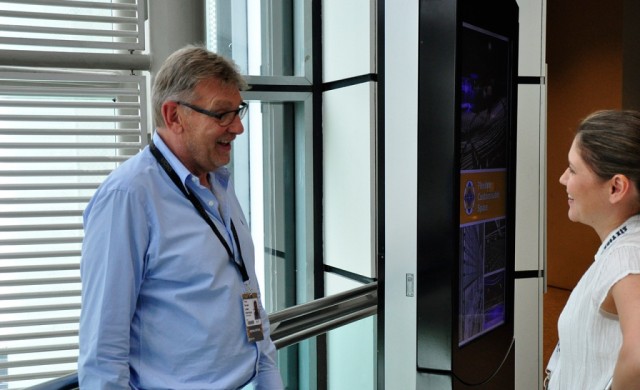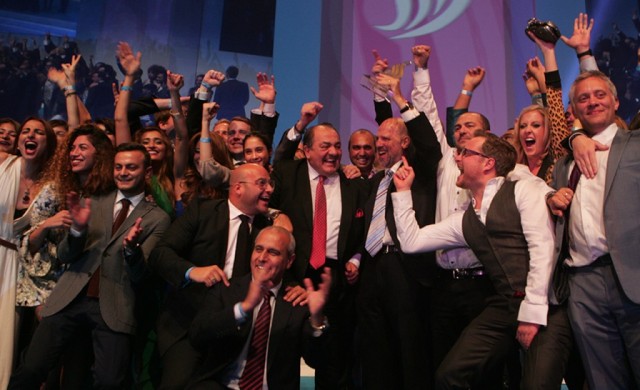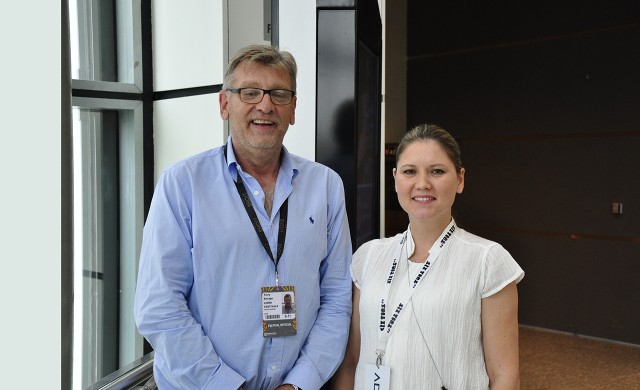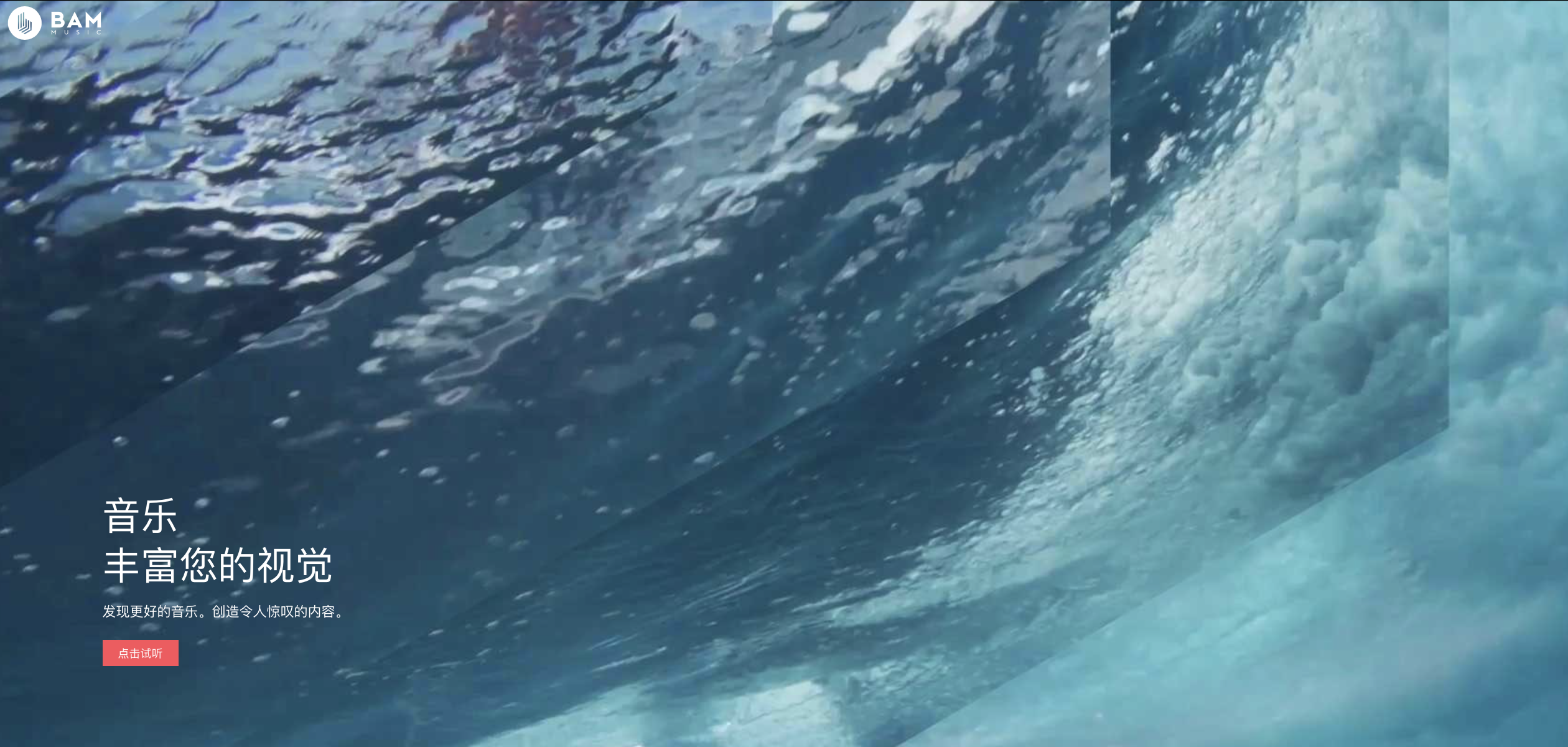Terry Savage is the Chairman of Lions Festivals, organisers of the world’s leading creative communication festivals. He took the helm of the company in 2003 and has since grown Cannes into the world’s most credible professional advertising event. Under his tenure, the company has founded the Dubai Lynx, followed by Spikes Asia in 2007, both of which have since risen to become the leading festivals in their respective continents. In 2013 he merged and relocated the Asia Marketing Effectiveness Awards and Digital Asia events from China into Singapore. SHP+ caught up with Savage at this year’s Spikes Asia in Singapore to discuss the changing nature of creativity, the status of his festivals worldwide, and his plans for returning to China.
 Savage talks with SHP+’s Maria Laletina at Spikes Asia 2015 | 2015年Spikes Asia期间,萨维奇与来自SHP+的Maria Laletina对谈
Savage talks with SHP+’s Maria Laletina at Spikes Asia 2015 | 2015年Spikes Asia期间,萨维奇与来自SHP+的Maria Laletina对谈
How has Cannes evolved since you took over in 2003?
When I took over, everyone thought it was a party. The first year my ad campaign was ‘less beach, more work’. The next year it was ‘all work, no beach’, because you are not going to get sustained investment from agencies whose margins are being squeezed tighter into these shows unless there’s a real return, not just for the people there, but bringing it back home to the office and broadening the market. If I’d just rested on it being a festival for creatives, the festival would have shrunk, whereas in fact it has grown by 15,000 delegates with marketers and tech people and all sorts.
How has the nature of creativity in the events changed over the years?
Many people want us to focus on film, print, outdoor and the more traditional media but the reality of creativity is changing dramatically. Whether we like it or not, data and innovation is going to play an incredible role going forward. Nor can you dismiss the concept of effectiveness or e-commerce. It’s no longer just the narrow set of platforms that we’ve seen in the past; it’s multifaceted and that’s going to continue to grow.
You run the leading creative festivals in Europe (Cannes Lions), Asia (Spikes) and the Middle East and North Africa (Dubai Lynx). North America is already well catered for, but is there a reason why you’ve never gone into South America?
There’s still massive growth for Cannes year on year and we’re seeing growth here in Asia. We want to drive the vehicles we’ve already got to maximum impact, as opposed to just going everywhere and doing them less well. Every market we’re in, we’re a market leader and that’s where we want to be. We’re not about putting tent-poles in the ground for the sake of it. The motivating forces for going into Asia and Dubai were to use them as a conduit into the market place, as a marketing tool to create a level of engagement in those regions to drive more people to Cannes. In South America, Cannes is so well known that we get 800 Brazilian delegates and 150 Argentinian delegates. That imperative just isn’t there.
 Ogilvy celebrate at Dubai Lynx 2014. The festival is the leading creative communication festival in the Middle East and North Africa. | 奥美在2014年迪拜国际广告节上举办庆祝活动。迪拜国际广告节是中东和北非地区重要的创意交流盛会
Ogilvy celebrate at Dubai Lynx 2014. The festival is the leading creative communication festival in the Middle East and North Africa. | 奥美在2014年迪拜国际广告节上举办庆祝活动。迪拜国际广告节是中东和北非地区重要的创意交流盛会
Why did you choose Singapore for Spikes?
For very simple reasons: it had great infrastructure, great hotels, great airline connections, it’s central and a lot of the regional head offices are here. When we first came here, the downside was that we didn’t think Singapore was very sexy, but that’s improved over the last eight years.
Did you consider China for Spikes?
Shanghai and Beijing are great markets, but they’re a six hour flight and not easy to get to for most of South East Asia. If we do something in China, it will be for China, not regional. China is it’s own market. We have learned that in China you’ve got to reflect what is happening there, that it’s a market that operates very differently from the South East Asian markets. It’s no good coming in and being a big western festival with western values in a market with a very unique approach and culture. If you’re going to do something, it has to be done in Chinese.
You previously held the Asia Marketing Effectiveness Awards (Beijing) and Digital Asia (Shanghai) events in China. Why did you discontinue them?
The problem was, they were in English because they were meant to be regional, but they were essentially becoming Chinese events – 80% of the delegates were Chinese, 100% of the sponsors were Chinese. I wasn’t pleasing the region, I wasn’t pleasing China – it was a schizophrenic event. I knew that they weren’t going to grow unless I made a bold decision; if we want to do something in China it’s got to be for China and make sure it’s focused and culturally embedded. As it was, I put them together and moved it to become a one-day event in Singapore (the Asia Marketing Effectiveness Awards).
What is your take on the Chinese presence at Cannes in recent years?
Last year we had an all-time record 330 delegates from China with a number of the big tech companies represented. But if you look at that number by comparison to the 2500 delegates we get from the US, then there is obviously potential for growth. Over the last couple of years, things have moved on very substantially. China is focusing on internal domestic consumption and that lends itself greatly to more creative advertising and more brand communication. We have the ability now to engage with really high-level speakers from China. There’s still a perception that China is a manufacturing center that copies, whereas anyone that goes there knows that’s not the case at all. There is some real creativity and innovation.
10 years ago, China won virtually nothing, but now we’re seeing them winning 17 Lions one year, 23 Lions the next, they’ve won two Grand Prix, Baidu won an innovation Lion at Cannes this year. They’re past the tipping point in terms of the levels of creative excellence. Now I think that’s got to spread from the 4A agencies into the emerging Chinese agencies.
Are you working on creating a new event in China?
Yes, we’ve been looking at it for a number of years. We clearly recognize that China is going to be a market of significant growth. It’s a case of finding the right time, the right place and the right people to work with. When you have a brand like ours, you have to protect that and make sure that when you do enter the market it’s a cut above anything else that already exists. When, not if, we go in to China, we will make sure it’s a world-class show.
What is your assessment of the Chinese industry?
The big issue for China is that talent development is lacking; you do not have a natural conduit to develop people. You cannot continue to just believe that creativity is a natural instinct; it’s got to be developed and fine-tuned. I think that’s missing in all markets, but I specifically think China has a lot of work to do. There are probably too many expats still working in the agencies.
Chinese brands have huge opportunities for internal growth and have been driving that growth very strongly, but it will reach a point – and I think we’re very close to that point, maybe even moving past it in some industries – where they’re going to be looking at going outside and expanding internationally. We’re already seeing that happen with the likes of BlueFocus, and certainly the big tech companies won’t remain only in China.
We want to display to the world the great Chinese creativity, innovation and steps forward on the one hand, but also bring a level of expertise and content in from the west that China can absorb and apply within their own framework, culture and understanding.
* Savage will be appearing at the China Advertising Festival in Xi’An in October 2015.
泰瑞·萨维奇(Terry Savage)是戛纳Lions国际广告艺术节主席,以及众多世界领先的创意交流盛会的组织者。自2003年掌舵公司以来,他已将戛纳打造成为世界上最不可错过的专业广告节。在他的任期中,公司创办了迪拜国际广告节(Dubai Lynx)。紧随其后的是2007年创办的亚洲尖峰广告节(Asia Spike)——这两个广告界都在其所处的大洲成为了区域内重要的专业盛会。201年,他合并了亚洲市场营销效果奖(Asia Marketing Effectiveness Awards)和数字亚洲(Digital Asia)两个活动,将之移师新加坡。SHP+在新加坡的亚洲尖峰上遇到了萨维奇,和他讨论了创意的本质、他所举办的一系列活动的世界影响,以及关于回到中国的计划。
你于2003年接手戛纳广告节。这么多年广告界取得了怎样的发展?
在我接手时,每个人都把它看做一个大派对。 第一年我的广告宣传主题是“更少沙滩,更多工作” (less beach, more work)。第二年变成了“全心工作,没有海滩”(all work, no beach’)。因为如果代理商不能从活动中获得真正的回报,他们的利润会被各种展览挤压,我们也无法得到代理们的稳定投资。并不仅仅是为了参加活动的代表们,也是为了他们将影响力带给公司,并且真正拓展市场。 如果我依旧把它视作一个供创意者们玩乐的节日,那这个节最终肯定会收缩规模。但事实上,现在它的规模已扩大到一万五千名代表,涵盖了市场营销、技术、以及其他领域。
在这个活动中,这些年创意的本质是否有所改变?
很多人希望我们关注影片、印刷业、户外广告以及很多其他传统媒体,但创意的实际情况确实发生着引人注目的变化。无论我们是否喜欢,数据和创新都在发展路上扮演着十分重要的角色。同样,你也不可能忽视经济效益或者是电子商务的理念。这已经不是我们原来看到的那个面向很窄的平台了。它已经多面向扩展,并将持续发展。
你不仅领导各大洲的创意广告节,欧洲的戛纳Lions,亚洲的尖峰(Spikes),以及中东和北非的迪拜国际广告节。北美同样也有相应的考量,但为什么你从没有去过南美呢?
在戛纳我们每一年都有进步,在亚洲我们也同样看到了发展。我们希望能将目前已经启动的项目的影响力扩至最大,而不是遍地撒网,最后效果一般。进入每个市场,我们希望自己都是顶尖的,这也是我们希望达到的目的,并不只是为了扩张而扩张。亚洲或者迪拜,其实都是打入市场的一个策略和渠道。最终目的是在这些区域创造一个窗口,让更多的人能去往戛纳。在南美,戛纳广告节已经非常有名,我们有800位来自巴西的代表,和150位阿根廷代表。所以没有必要在这个区域扩张。
为什么选择在新加坡举办Spikes?
很简单的理由:完善的基础设施、酒店、和健全的航空建设。新加坡位于中心,很多区域办事处也驻扎于此。当我们一开始来到这里时,并不觉得这是一座性感的城市。但在这8年间,新加坡确实发展了很多。
是否考虑过在中国举办Spikes呢?
中国拥有它自己的市场。我们已经了解到,你必须知道中国正在发生什么——这里的市场和东南亚非常不同。仅仅是到达中国,以西方的价值观举办西方的广告节,并不明智。中国市场有它独有的特点和文化。如果你希望创造什么,那必须是用中文来做。
上海和北京都有很好的市场,但都要乘坐六个小时的航班才能到达,并且并不很容易达到东南亚最远处。如果我们想在中国有所作为,那必须是为中国量身定做的,而不是区域性的。
你曾在北京举办市场营销效果奖(Marketing Effectiveness Awards),在上海举办数字亚洲(Digital Asia)。为什么没有将这两个活动进行下去?
问题在于,这两个活动是英文的,因为他们都是面向整个大区域。但是,其本质上又是属于中国的活动——80%的代表是中国人,我们所有的赞助商也都是中国的。活动既没有迎合大区域,也没有迎合中国——活动显得非常分裂。我知道,除非我大胆决定改变,否则他们并不会得到真正意义上的发展;如果想在中国有所作为,那活动必须针对中国,专注中国,并和文化紧密连接。基于此,我将这两个活动合并在新加坡举办(亚洲市场营销奖),为期一天。
你如何看待中国代表在戛纳的表现?
去年我们有330名来自中国的代表,大量科技公司的代表出席了活动。但如果横向比较——比如有2500位代表来自美国,你会知道其中还蕴含着巨大的潜力。最近几年情况持续发展,中国将重心放在了国内消费上,而这也让他们需要更多的广告创意和品牌交流。我们如今有能力同来自中国的真正高端的代言人交流接洽。依旧有观点认为,中国是一个抄袭创意的制造中心,但稍微对中国有所认识的人都知道情况已今非昔比。中国真正拥有创意和革新。
十年前,在可见的奖项上,中国确实没有斩获,但如果我们现在来看,他们一年获得了17个Lions奖项,而第二年获得23个。他们获得了两个Grand Prix,而百度赢得了今年戛纳的创新奖。在杰出创意方面,他们已经度过了临界点。现在我认为创意正从4A公司涌向中国公司。
最近有在中国策划新的活动吗?
是的,好几年来我们都专注于此。我们已经意识到中国将成长为重要的市场。重点在于,需要找到正确的时间,正确的人和正确的地点来工作。如果你有一个像我们这样的品牌,你必须保证,进入一个新市场时,相较已经存在的其他品牌而言,我们必须有发展的捷径。如果我们一旦进入中国市场,就必须保证这是一个具有世界水准的活动。
你对中国(广告)行业的评价如何?
中国有一个很重要的问题在于,整体缺乏人才培养,这里缺乏培养人才的渠道。你不能只是相信,创意是一个天赋的能力——它依旧需要发展和调整。其实几乎所有市场里都存在这个问题,但中国尤其严重,还有很长的路要走。在代理商那里做事的外国人太多了。
中国的品牌们都拥有巨大的内部发展的机会,他们成长得非常迅速。但他们会达到一个时间点——我认为我们非常接近这个点了,甚至在某些行业已经过了这个——那时他们会想走出去,在国际范围内取得更大的发展。已经可以看到,像BlueFocus这样的公司已迈出了这一步。显而易见,这些大的科技公司不会仅仅停留在中国。
我们希望,能向世界展示中国的创造力、创新能力,一方面推进发展,一方面从西方带给这些行业以更为专业领先的水准。希望中国能好好消化,并在他们自己的框架、文化和理解中接收和发展。
* 萨维奇将出席2015年10月在西安召开的中国国际广告节(China Advertising Festival)。





 BAM Music Library Brings Edgy, Indie Sounds to Chinese Creatives
BAM Music Library Brings Edgy, Indie Sounds to Chinese Creatives
